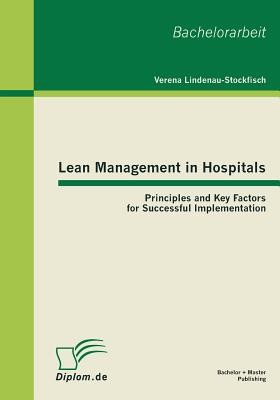
- We will send in 10–14 business days.
- Author: Verena Lindenau-Stockfisch
- Publisher: Bachelor + Master Publishing
- ISBN-10: 3863410181
- ISBN-13: 9783863410186
- Format: 17.8 x 25.4 x 0.4 cm, minkšti viršeliai
- Language: English
- SAVE -10% with code: EXTRA
Reviews
Description
The healthcare system of today's westernised civilisation holds a paradox: on the one hand, hospitals equipped with state-of-the-art-technology and well-educated staff working under best hygienic conditions is regarded standard. On the other hand, our healthcare system is ailing and cutbacks in capital spending, wages and personnel appear on the agenda. Accordingly, a more sophisticated approach that helps hospitals to work efficiently and effectively is needed. Among quality management tools, Lean is one suitable methodology that can help healthcare organisations out of the dilemma. Originally, Lean is a management methodology that goes back to production processes with the main aim to increase output by reducing input. The lean philosophy has its origin in the Japanese manufacturing industry and is strongly bound to the Toyota Production System (TPS). In hospitals, Lean is ideally based on three main pillars: process optimisation, patient-oriented management as well as engaging and leading employees. The first chapter of the book deals with the main principles and tools of Lean to give readers an overview about the basic ideas of this management philosophy. The understanding for waste and wasteful activities will be enhanced and tools such as Kanban, Kaizen and Value Stream Mapping, that are helpful for identification and elimination of waste, will be introduced. Furthermore, new terms and concepts such as Lean Sigma, telemedicine and e-health are examined. For Lean to tap its full potential, human aspects must be considered likewise. One of the most important aspects in hospitals is the successful management of patients. The second chapter concentrates on factors that positively influence the bottom line in a hospital. Thus, patient satisfaction, strategic alliances in the healthcare environment and hospital marketing are of main focus since all these aspects are considered value-adding steps that help to increase service quality and to streamline processes in
EXTRA 10 % discount with code: EXTRA
The promotion ends in 22d.00:30:26
The discount code is valid when purchasing from 10 €. Discounts do not stack.
- Author: Verena Lindenau-Stockfisch
- Publisher: Bachelor + Master Publishing
- ISBN-10: 3863410181
- ISBN-13: 9783863410186
- Format: 17.8 x 25.4 x 0.4 cm, minkšti viršeliai
- Language: English English
The healthcare system of today's westernised civilisation holds a paradox: on the one hand, hospitals equipped with state-of-the-art-technology and well-educated staff working under best hygienic conditions is regarded standard. On the other hand, our healthcare system is ailing and cutbacks in capital spending, wages and personnel appear on the agenda. Accordingly, a more sophisticated approach that helps hospitals to work efficiently and effectively is needed. Among quality management tools, Lean is one suitable methodology that can help healthcare organisations out of the dilemma. Originally, Lean is a management methodology that goes back to production processes with the main aim to increase output by reducing input. The lean philosophy has its origin in the Japanese manufacturing industry and is strongly bound to the Toyota Production System (TPS). In hospitals, Lean is ideally based on three main pillars: process optimisation, patient-oriented management as well as engaging and leading employees. The first chapter of the book deals with the main principles and tools of Lean to give readers an overview about the basic ideas of this management philosophy. The understanding for waste and wasteful activities will be enhanced and tools such as Kanban, Kaizen and Value Stream Mapping, that are helpful for identification and elimination of waste, will be introduced. Furthermore, new terms and concepts such as Lean Sigma, telemedicine and e-health are examined. For Lean to tap its full potential, human aspects must be considered likewise. One of the most important aspects in hospitals is the successful management of patients. The second chapter concentrates on factors that positively influence the bottom line in a hospital. Thus, patient satisfaction, strategic alliances in the healthcare environment and hospital marketing are of main focus since all these aspects are considered value-adding steps that help to increase service quality and to streamline processes in


Reviews